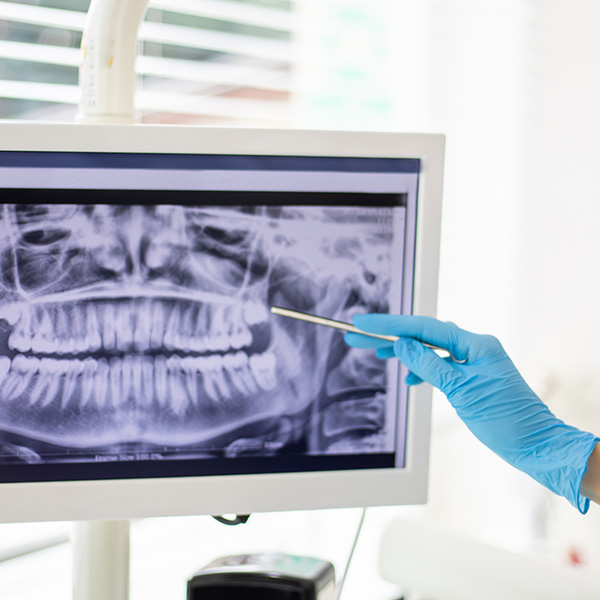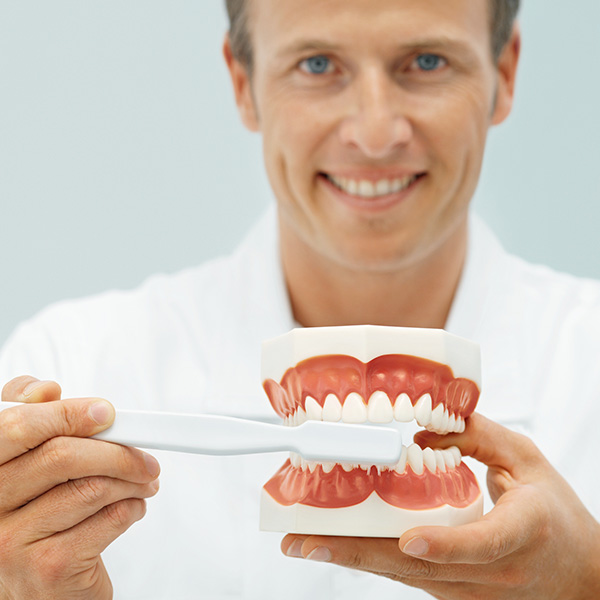General Dentistry

Dental Exams & Cleanings
Regularly scheduled dental exams and cleanings maintain a healthy and clean mouth to prevent any future issues. During these visits, a dental hygienist thoroughly cleans your teeth beyond what a patient can do by themselves at home with consistent brushing and flossing. Plaque that has hardened near the gum line and between teeth which can lead to periodontal (gum) disease is removed. Then the dentist will examine your teeth, gums, and other areas of your mouth to detect any current or future problem areas. We recommend that patients schedule dental cleanings and exams every six months to maintain a clean and healthy mouth.
What are you waiting for? Contact us today to schedule your next dental exam and cleaning.

Digital Radiographs (X-Rays)
Annual dental radiographs are required to diagnose various conditions of the teeth and bone that cannot be seen during a visual exam. Some of these conditions include decay between teeth, bone loss due to periodontal (gum) disease, and cysts or abscesses.
Radiographs vs X-Rays
Digital x-rays, as opposed to traditional methods of creating x-rays, replace traditional film with an electronic picture that the dentist can look at immediately after capture. With a digital x-ray, you can see the results and your dentist will be able to access what needs to be done and the best way to do it. This method is safer for the patient and the doctor because less radiation and no harmful chemicals are used to create and develop the film.
Make an Appointment Today
Is fear holding you back from getting your teeth x-rayed? Don’t let the fear of visiting the dentist keep you from having the stunning smile you deserve. The professional and sensitive dentists at Bayshore Dentistry offer numerous options and services, including sedation dentistry, to ensure you enjoy a relaxed and calm dental appointment. We are here to take care of everything your teeth need, from getting your teeth cleaned to restoring your implants, treating periodontal disease and gingivitis, repairing cavities, root canal treatments, dentures, partials, and more. Bayshore Dentistry strives to make your visit the best you have ever had and our outstanding technology and services can repair your smile to the most glamorous appearance you can be proud of and will want to show off to the world.

Brushing & Flossing
Brushing & Flossing Your Teeth
Brushing your teeth is an essential part of good oral health, it not only helps prevent tooth decay, but it also helps prevent periodontal (gum) disease. Periodontal disease is one of the leading causes of tooth loss in adults and has been linked to heart attacks and strokes. To get the best overall health, you need to be brushing & flossing your teeth daily. Our dental team can give you valuable instructions for brushing and flossing techniques, that will improve your efforts to remove the plaque and bacteria that cause periodontal disease.
Flossing Teeth Properly
Flossing is an important component of your dental hygiene routine. While brushing eliminates a large percentage of plaque, the brush can’t reach between the teeth or under the edges of the gums to clean the entire tooth. Flossing helps accomplish this by loosening food particles in nooks and crannies that brushes don’t reach. Regular visits to a general dentist are also important to your overall oral hygiene.
Brushing Teeth Properly
Brushing your teeth twice a day can eliminate plaque and reduce the chance of severe tooth decay. Brushing cleans away food particles that stick to the teeth as well as the plaque and bacteria that collect around them. Brushing can stimulate your gums, keeping them strong and healthy.

Gingivitis & Periodontal Scaling
Correct Gingivitis Before It Is Too Late
Gingivitis, a reversible form of periodontal (gum) disease, is the swelling of the gums caused by bacterial infection, usually from plaque. If left untreated gingivitis can advance into a non-reversible, destructive form of periodontal disease. Although the best preventative measure is to brush and floss regularly, periodontal treatment may be necessary if a more serious case develops. Sometimes, Periodontal Scaling and Root Planing are required.
If left untreated, gingivitis will progress to the next stage of disease, called Periodontitis, where the bone is also affected. In this stage of Periodontal (gum) disease the gingiva (gums) become noticeably inflamed, tender, and bleed to the touch. The teeth may become sensitive, due to the recession of the gingival tissue down the tooth root. This recession causes the loss of connective fibers that anchor the tooth into the bone resulting in tooth mobility and possible tooth loss.
Please let the Bayshore Dental team assist you in saving your teeth from the devastating effects of Periodontal Disease.
Periodontal Scaling and Root Planning Treatment
Periodontal Scaling and Root Planning involves using a special tool called a scaler to clean the tartar and plaque that developed below the gum line. After this process, the gum tissue will normally heal and reattach itself to your teeth. In some cases, periodontal surgery may be required.

Composite Resin Fillings
For over 100 years, cavities have been repaired with “silver fillings” also called silver amalgams which are a mixture of different metals including silver, tin, and copper. Modern dentistry has developed the preferred method of using resin fillings (tooth-colored fillings).
Bayshore Dentistry Composite Resin Fillings
Composite Resin fillings are tooth-colored, bonded fillings that are often used instead of silver fillings for a more aesthetic, natural-looking result. Commonly called “white fillings”, composite resin fillings are created to perfectly match your teeth so that cavities and decay-prone areas of your teeth can be “filled” while still maintaining an aesthetically pleasing, natural-looking smile.
Created to resemble the color of your natural teeth, the composite resin is easy to use and bonded to your teeth to repair any decay damage. Composite resin is made up of glass or quartz filler added to the resin medium to attain the tooth-colored filling medium. There is no metal and it can be shaped to resemble a real tooth so that often people can’t tell where their own fillings are.
For many years amalgam or “silver fillings” were the only choice to be had when it came to decay and cavity repair. Now, there are many options, including the popular composite resin choices. Proper care and maintenance such as brushing and flossing still have to be done to ensure the health of the rest of your tooth’s enamel, even after the composite resin filling is bonded.
We work with all types of insurance options and provide numerous payment plan options that can fit your budget. Set up an appointment today to have a consult and see if a composite resin filling could be the perfect solution to correcting decay or cavities in your teeth.

Root Canals
A Root Canal or Endodontic treatment is necessary when the pulp becomes inflamed or infected. The inflammation or infection can have a variety of causes:
- Deep decay
- Repeated dental procedures on the tooth
- A crack or chip in the tooth
In addition, acute trauma to a tooth may cause pulp damage even if the tooth has no visible chips or cracks. If pulp inflammation or infection is left untreated, it can cause pain or lead to an abscess. Signs of pulp damage include pain, prolonged sensitivity to heat or cold, discoloration of the tooth, and swelling and tenderness in the nearby gums.

Crowns
A crown restores a chipped, broken, cracked, or decayed tooth to a healthy and natural-looking state by encapsulating the damaged tooth inside a natural or synthetic material. Crowns become the new outer surface of the tooth, protecting the fragile natural tooth inside from further damage.
This restoration is especially recommended for teeth that already have large existing fillings, teeth that are broken, or teeth that have undergone root canal treatments. Traditional crowns are created out of metals such as gold, but modern more visually appealing fillings are made out of porcelain or ceramic.
